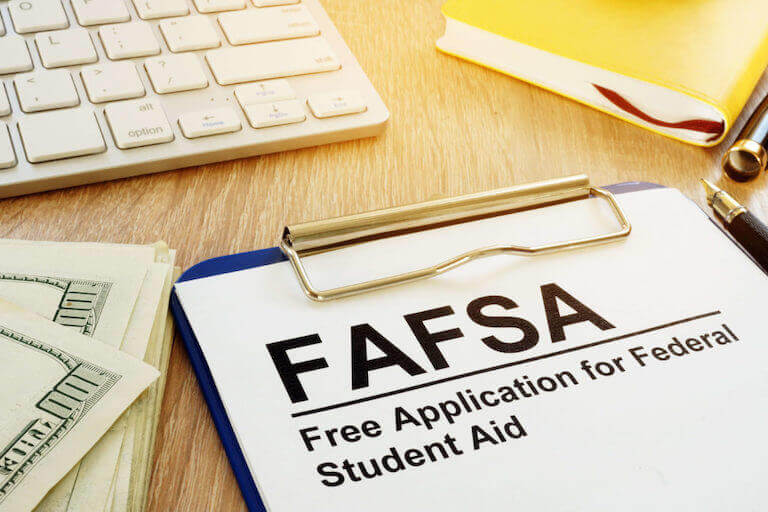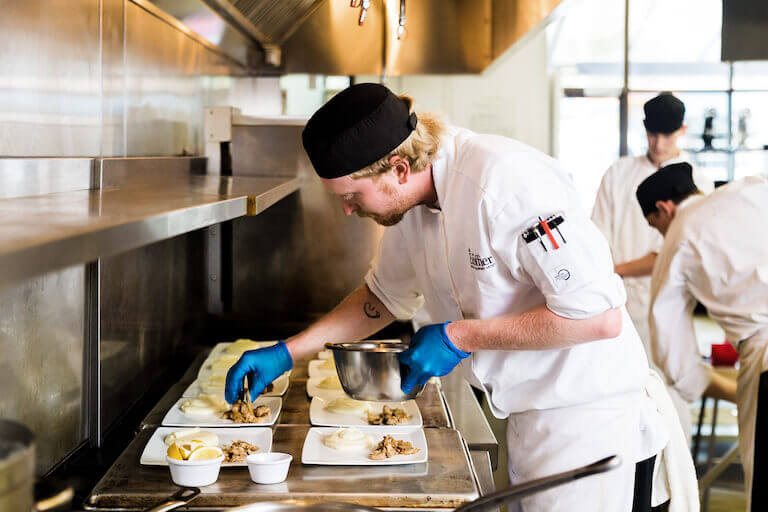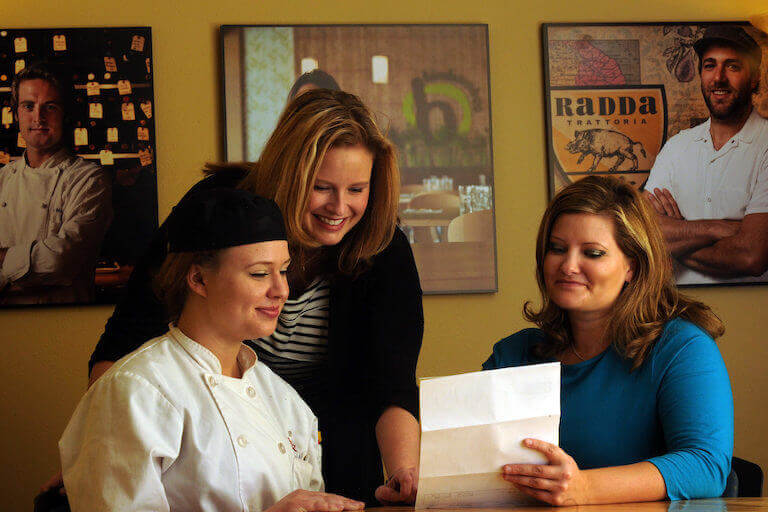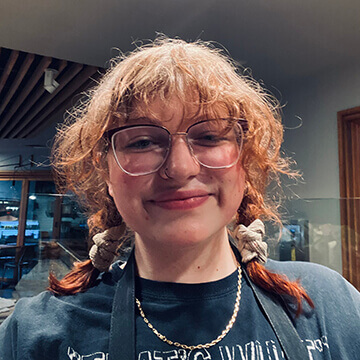You’ve decided to attend culinary school to get closer to your dreams of working with food.
That’s fantastic!
Now…how are you going to pay for it?
Most incoming students have lots of questions about how financial aid works. So we sat down with a few of Escoffier’s Financial Aid advisors for answers to prospective and current students’ most common questions.
The Most Common Questions About Financing Your Culinary Education
Am I Eligible for Financial Aid?
Financial aid to attend Escoffier may be available to those who apply and qualify.**
To find out if you qualify, begin by filling out the Free Application for Federal Student Aid (FAFSA®). This form is the starting point for all Title IV funding, which includes Direct Loans, Pell Grants, Parent PLUS Loans, and federal work-study programs.
Even if you don’t think you’ll be eligible for aid, you won’t know for sure until you submit your FAFSA!
When Do I Have to Submit My FAFSA?
FAFSA operates based on its Award Year, which spans from July 1st to June 30th of the following year.
Students typically have through the following June to submit. For example, a student attending school in the 2024-2025 school year could submit their FAFSA by June 30, 2025.**
Escoffier doesn’t impose any additional deadlines on FAFSA applications, so students are free to submit any time before that June deadline. That said, it’s better to submit sooner than later.
If a student begins their program at Escoffier in January, their first year of courses will straddle two academic years. So students may have to fill out the FAFSA twice—once for their courses from January through June, and once for their courses from July through the following June.

I Don’t Think I’ll Be Eligible for Federal Aid…Should I Bother with the FAFSA?
Absolutely! You’ll never know if you’re eligible for aid until you apply. Many Escoffier students are eligible for some kind of federal funding. While we cannot guarantee that any individual student will get that funding, the only way to find out is to complete the FAFSA.
It can take about an hour, and could be the key to funding your education.*
What Is “Verification”?
After submitting the FAFSA, a student could be selected by the Department of Education for a process called verification. The process asks the Escoffier Financial Aid office to verify the information that the student supplied on the FAFSA.
Your financial aid administrator can help you to provide the documentation necessary to complete the verification process.
When Is My First Payment Due to Escoffier?
For online students, the first three weeks of a new student’s first term are referred to as the “conditional enrollment period.” For on-campus students, this period is one week. During this time, students may begin attending courses without providing any funding to Escoffier. This allows you to make sure Escoffier is a good fit before you begin making payments.
Despite this conditional enrollment period, it’s always best to have your financial plan in place before the first day of class. We don’t want students to be concerned about money during their first few weeks of school.
On start day, students make their first payment, either directly or through their federal aid, if they haven’t done so already.

Common Questions About Student Loans
Will My Financial Aid Cover the Entire Cost of School?
Based on the results of your FAFSA, you may be provided a financial plan. This is often a combination of loans (which have to be repaid) and grants (which typically do not have to be repaid.)*
Some students may have a funding gap that they cover through a payment plan with Escoffier, an internal scholarship, or outside funding like a 529 education savings plan or outside scholarship.*
What Is the Difference Between Types of Loans?
There are different types of student loans that you should know about.
Federal vs. Private Student Loans
Federal loans come from the U.S. Department of Education, and include Direct Loans and Parent PLUS Loans. They often have a lower interest rate and lower processing fees than private loans. Many students use federal student loans to help pay for culinary school.
Private loans come from private lenders like Sallie Mae, Freddie Mac, and banks or credit unions. The interest rates and loan terms can vary widely for this type of loan. Currently, Escoffier does not have partnerships with any private loan servicers.
Direct Subsidized Loans vs. Direct Unsubsidized Loans
There are two types of federal Direct Loans: subsidized and unsubsidized. Direct subsidized and unsubsidized loans are both issued based on the results of your FAFSA. Both of these loans have an interest rate of 6.53% for the 2024-2025 school year. (This changes upon review from year to year, so check the FAFSA website for the most up-to-date information.)
The only difference is that, with subsidized loans, borrowers don’t start paying the interest until six months after they graduate or leave school; the federal government pays the interest until then (hence the term “subsidized.”). Unsubsidized loans begin accruing interest right away, which can make them more costly over time. Most of our students who receive federal aid have a combination of subsidized and unsubsidized loans.*
How Much Could I Get in Direct Loans?
| School Year | Dependent Students |
Independent Students (and dependent students whose parents can’t get a PLUS Loan) |
|---|---|---|
| 1st Year Undergraduate Students | $5,500 (up to $3,500 in subsidized loans) | $9,500 (up to $3,500 in subsidized loans) |
| 2nd Year Undergraduate Students | $6,500 (up to $4,500 in subsidized loans) | $10,500 (up to $4,500 in subsidized loans) |
Parent PLUS Loan
A Parent PLUS Loan is provided to the parent(s) of an eligible student to fund their education. These loans have an interest rate of 9.08% for the 2024-2025 school year. (This changes upon review from year to year, so check the FAFSA website for the most up-to-date information.)
How Do I Get My Funds?
After granting the school permission, students will have their funds credited directly to their Escoffier accounts to cover tuition and required fees, rather than receiving the funds directly.*
Funds are provided in installments, instead of one lump sum. Students must continue to “earn” their funding by passing their classes and moving through their programs. These milestones usually require students to complete a certain number of credit hours to release their funds. Loan payments to the school are usually made twice per academic year.
Can I Get Another Type of Financial Assistance to Cover My Student Loans?
You do have the option to secure your own funding outside of the federal government.* But Escoffier does not make recommendations or have partnerships with private loan servicers.
Some students may borrow money from banks or family members to fund their education. This option is dependent on each individual student and their personal circumstances.*
Common Questions About Repaying Student Loans
What Is An Exit Interview?
According to federal guidelines, all students who received financial aid must complete an exit interview near the end of their programs and can find counseling available at studentaid.gov.
The exit counseling can help you to understand your loan obligations. You will learn where and how to make your payments, as well as the payment plans open to you. Some plans require a fixed payment every month, while others start with a lower monthly payment and graduate to a higher monthly payment a few years down the line.
When you complete the exit counseling, you can have a clearer sense of how and when to begin making your loan payments. Students will need to continue working directly with their assigned loan servicer on the payment plans for Direct Loans through the Department of Education.

What Is a Grace Period?
Federal student loans have a six-month grace period after the student either graduates their program or leaves school. Under normal circumstances, the first payment on your student loans will become due after that six-month grace period.
This gives students time to find a job after graduation, before they have to start making payments.

What If I Can’t Afford to Make Payments on My Loans?
Every student with federal loans goes into a standard 10-year repayment program by default, which starts 6 months after graduation, under normal circumstances.
If you can’t afford your payment, don’t hide from it! It’s not going to go away. Instead, contact the Loan Servicer to discuss loan repayment options.
They may be able to offer you a deferment or forbearance, which allows you to temporarily stop making payments and get your finances back in order. Interest continues to accrue during deferment. There could also be the option to switch to an income-based repayment plan.*
You won’t know if you’re eligible for one of these solutions until you reach out to the Loan Servicer!
Common Questions About Military and Veteran Benefits
Is Escoffier Eligible for Military Benefits?
Yes! All Escoffier programs are approved to accept certain military benefits for students who apply and qualify.*
This includes Veteran Administration Benefits like the Post-9/11 GI Bill®, Dependants Education Assistance, and the Reserves Educational Assistance Program. It may also include Military Tuition Assistance through the Department of Defense.
“I worked with the Financial Aid Director, who helped me get some of the scholarships I qualify for because my dad is a disabled veteran.”*
Kadie Sardo, Escoffier Culinary Arts Graduate
How Much Aid Am I Eligible For?
The amount of aid available to military and veteran students is determined by the Veterans Administration and the Department of Defense. So students must reach out to the appropriate military departments to answer this question.
Where to Start Looking for Military/Veteran Funding
Apply for the GI Bill® and other VA education benefits.
To apply for Military Tuition Assistance, reach out to the appropriate branch of the military with these links:
Common Questions About Scholarships and Grants
What’s the Difference Between a Scholarship and a Grant?
Both scholarships and grants are financial gifts that typically do not have to be repaid.
A general definition states that grants are usually need-based, while scholarships are awarded based on merit. This doesn’t always hold true, as some private institutions may offer a merit-based award that they label a “grant.”
The important thing to note is that they usually don’t have to be repaid, so they’re both highly desirable forms of aid!
Learn More About Culinary School Scholarships
Explore need-based, merit-based, and competition-based scholarships with our Essential Guide to Culinary School Scholarships.
Can I Pay for School Entirely with Scholarships and Grants?
It’s possible! Many students think they won’t be eligible for scholarships, but you’ll never know unless you apply.
Escoffier students have even received substantial scholarships from the James Beard Foundation that covered some of their educational expenses.*
Applying for scholarships doesn’t have to be as hard as it seems. For example, you could write a great essay that you might be able to reuse for a number of scholarship applications.
What Is a Pell Grant?
A Pell Grant is a federal financial award provided to undergraduate students who demonstrate financial need based on the results of the FAFSA. A Pell Grant does not have to be repaid in most circumstances.
How Much Funding Could I Receive in Pell Grants?
The maximum federal Pell Grant award for the 2024-2025 school year is $7,395. Actual awards may vary based on criteria including your Expected Family Contribution and the cost of your program.*
What Scholarships Are Available To Me?
At Escoffier, we have our own institutional scholarships for students, and we can help walk you through the application. There are scholarships available based on need, high-school activity, having a job in the industry, and veteran status.
We also accept many different types of outside scholarships!
Peek into the 7th Annual Young Escoffier High School Competition, with nearly $80,000 in available culinary school scholarships.
Do You Have More Questions About How Financial Aid Works? Contact Escoffier’s Financial Aid Department!
You may have questions about your specific financial circumstances. That’s what Escoffier’s Financial Aid department is for!
Contact us with additional questions so you can make smart, informed choices about attending and paying for culinary school!
Learn more about paying for your culinary education with these articles:
- Is Culinary School Expensive?
- Can You Deduct College Tuition From Taxes?
- How Long Does it Take to Pay Back Student Loan Debt…And Is It Worth It?
This article was originally published on September 29, 2022 and has since been updated.
*Information may not reflect every student’s experience. Results and outcomes may be based on several factors, such as geographical region or previous experience.
**The funding sources listed in this article are third-party offerings and not offered by Auguste Escoffier School of Culinary Arts. Open dates, deadlines, and application criteria may change. Always check the provider’s website for updated information.
***Consider your situation and resources to determine what is affordable and on budget, for you.
****95% of Austin students and 59% of Boulder students who entered postsecondary education for the first time received some financial assistance in 2022-23 for those who applied and qualified. College Navigator, National Center for Education Statistics

 “I worked with the Financial Aid Director, who helped me get some of the scholarships I qualify for because my dad is a disabled veteran.”*
“I worked with the Financial Aid Director, who helped me get some of the scholarships I qualify for because my dad is a disabled veteran.”*